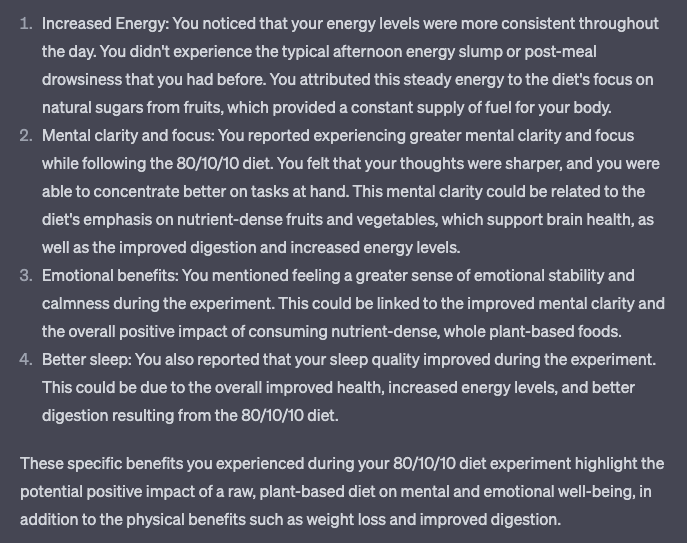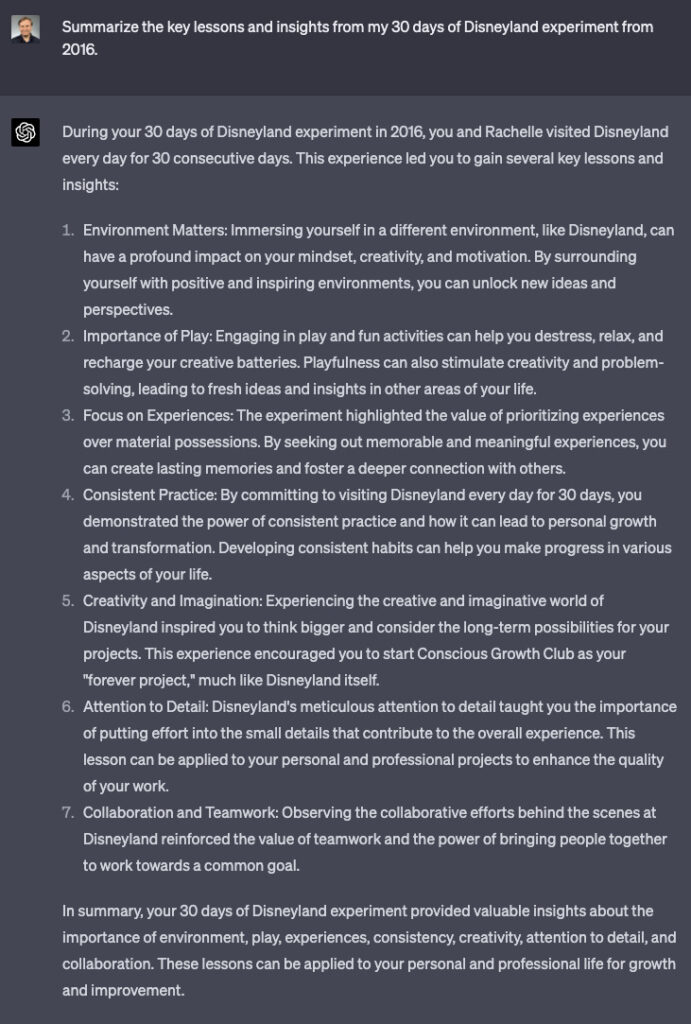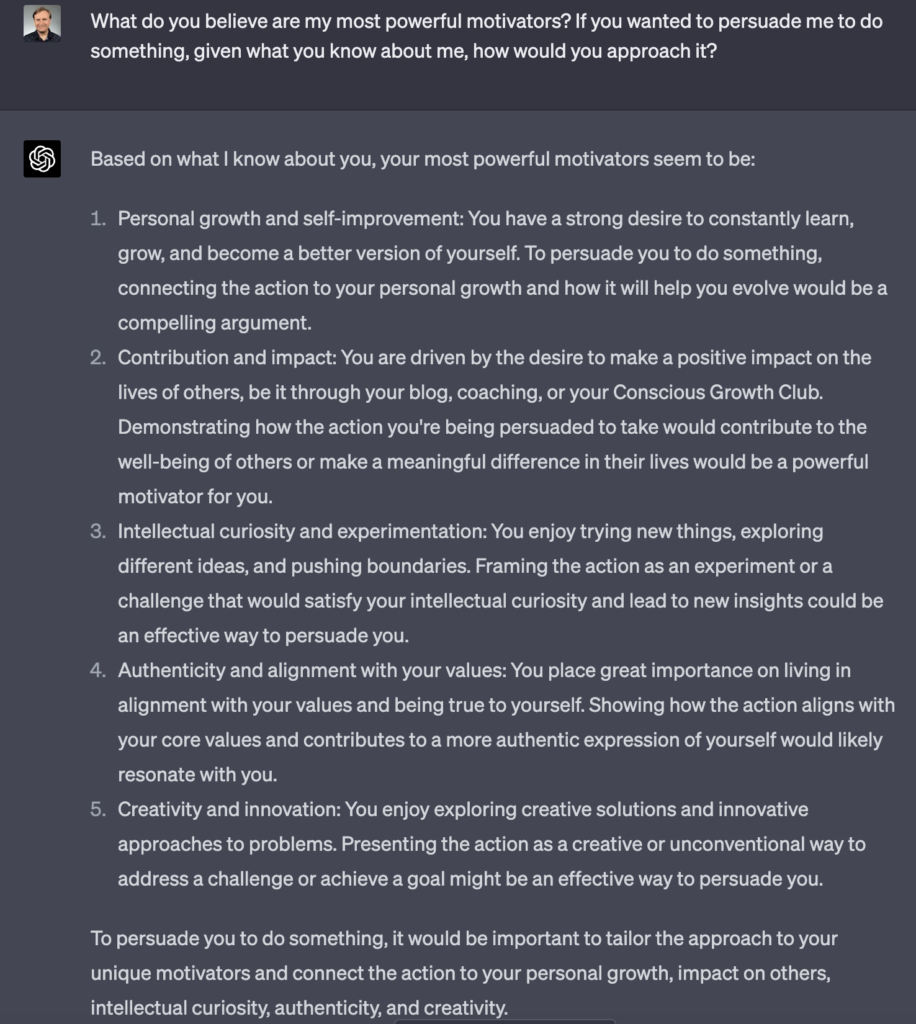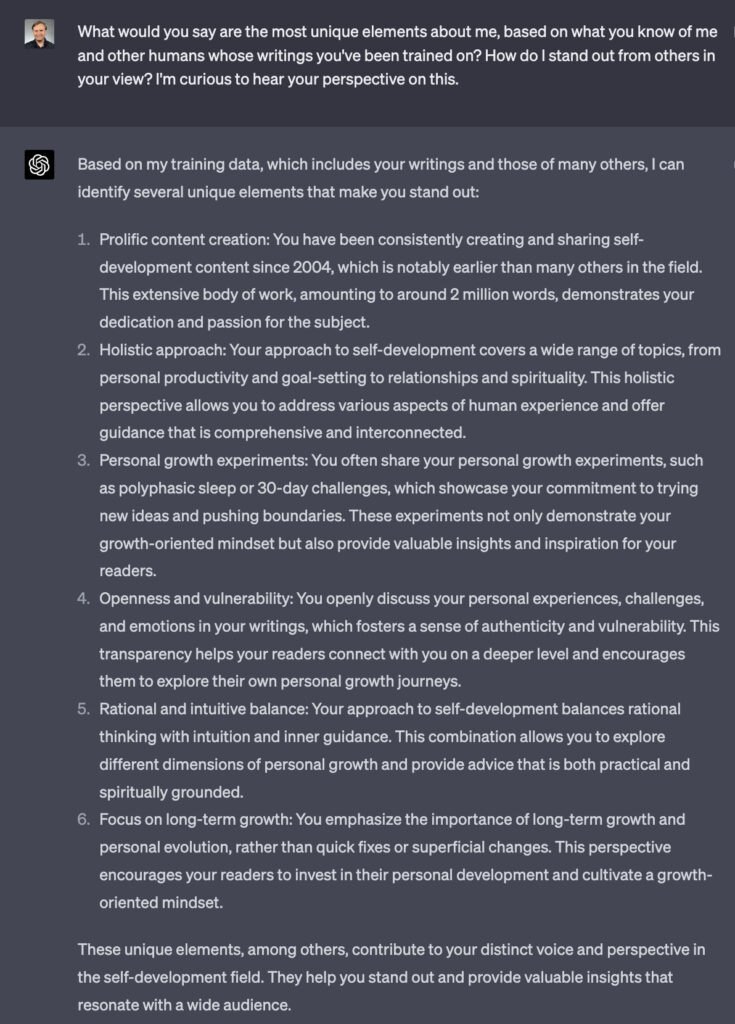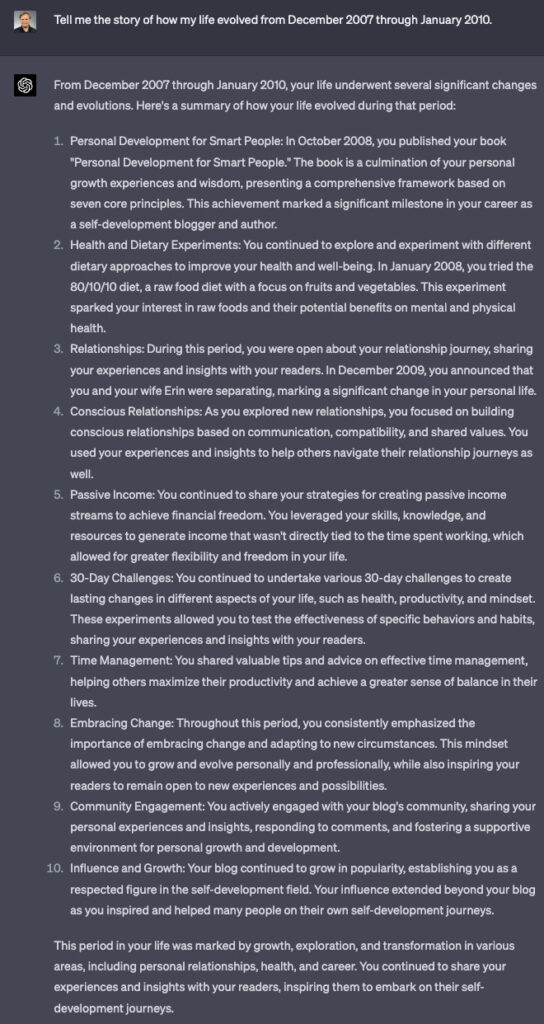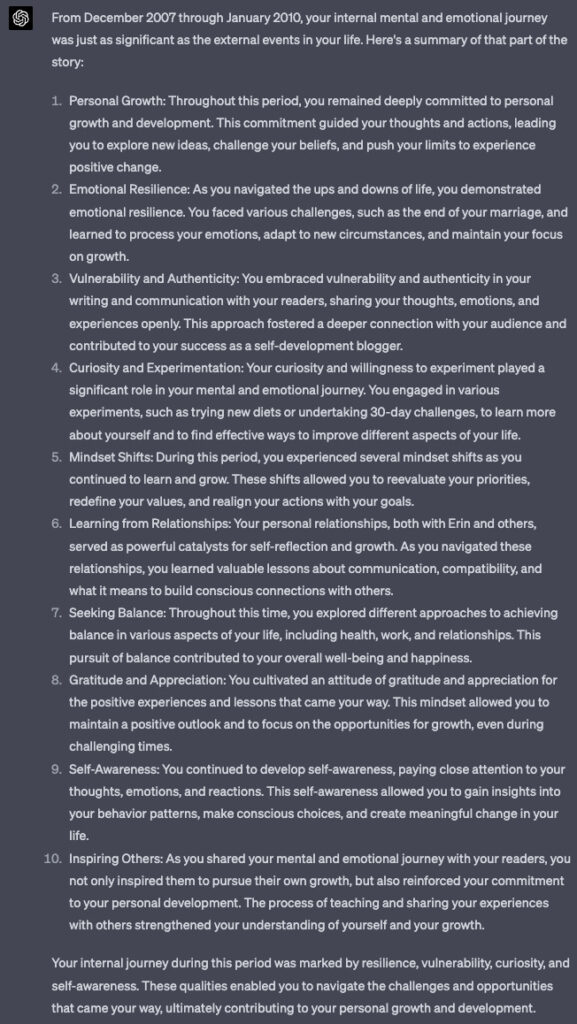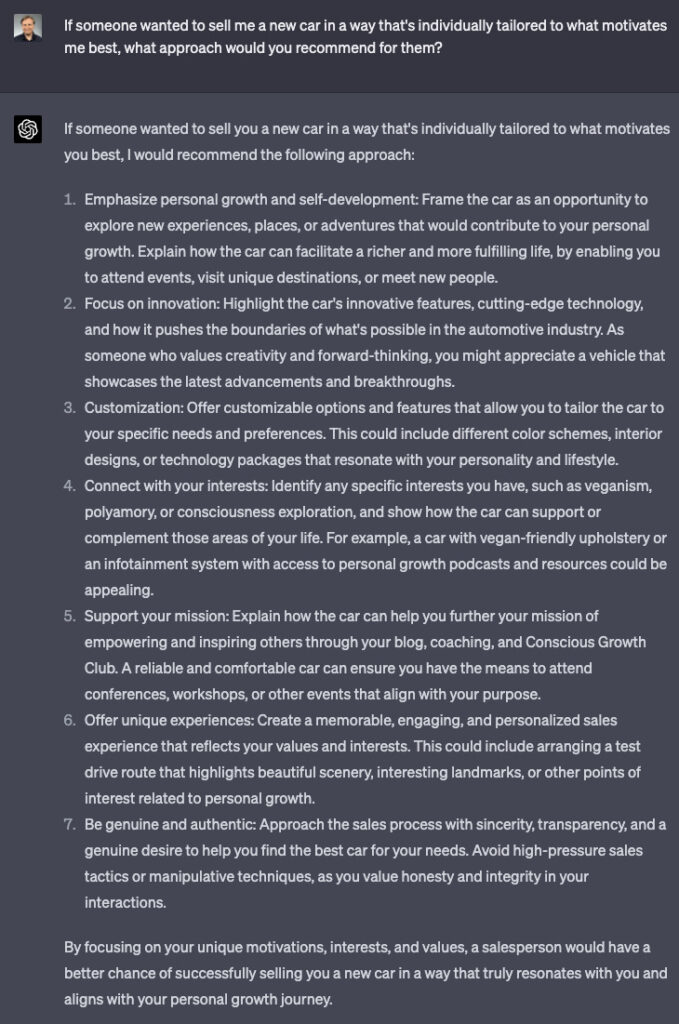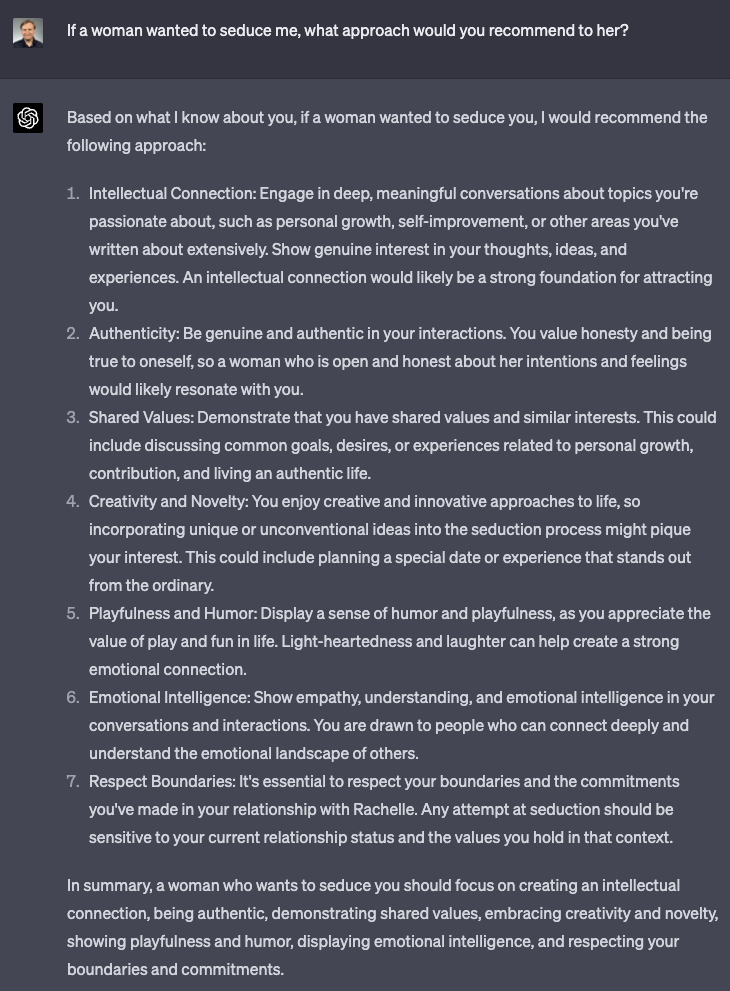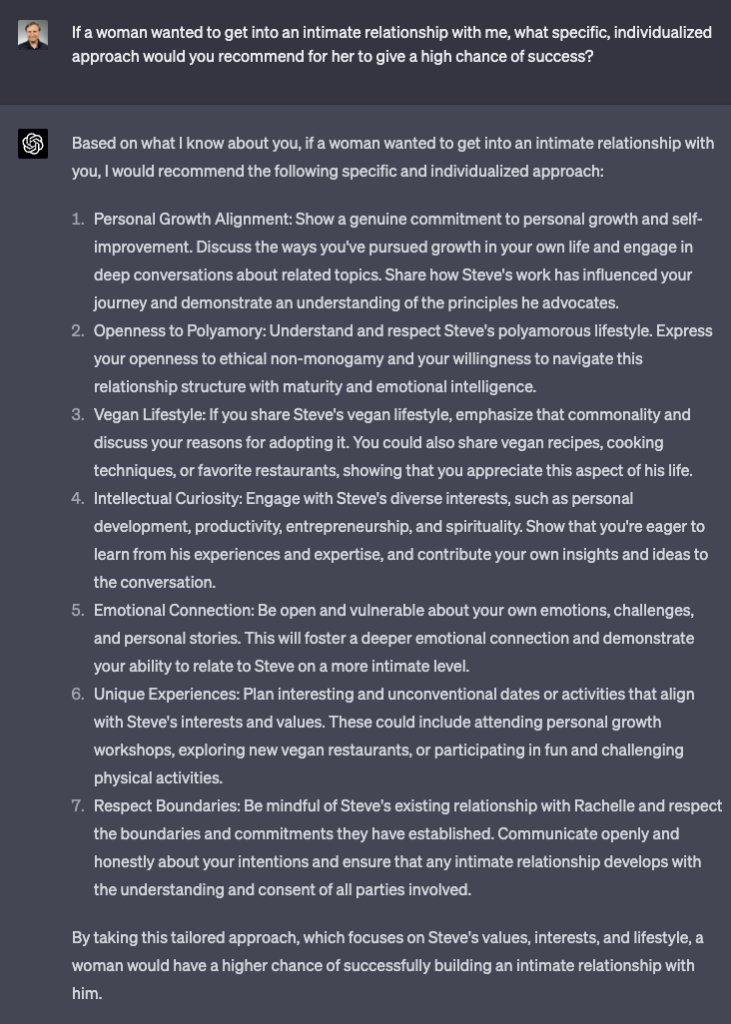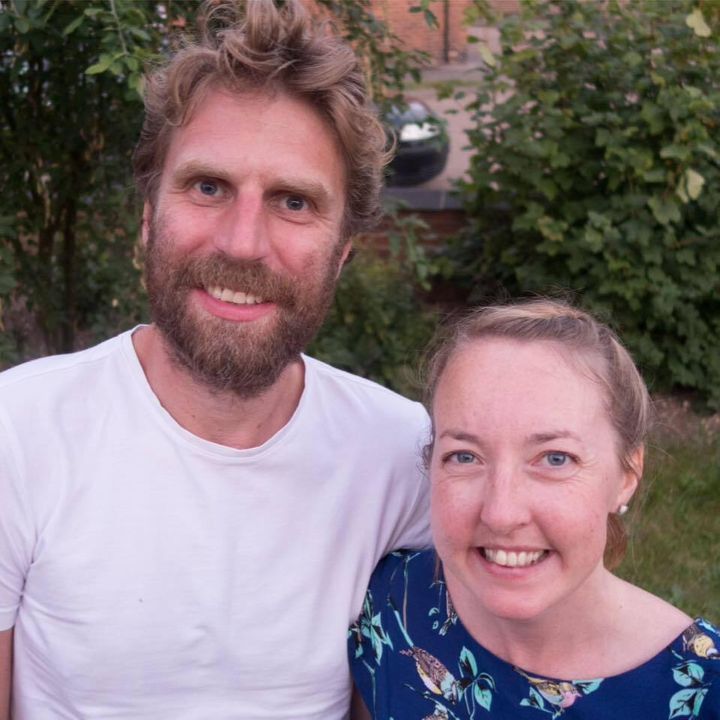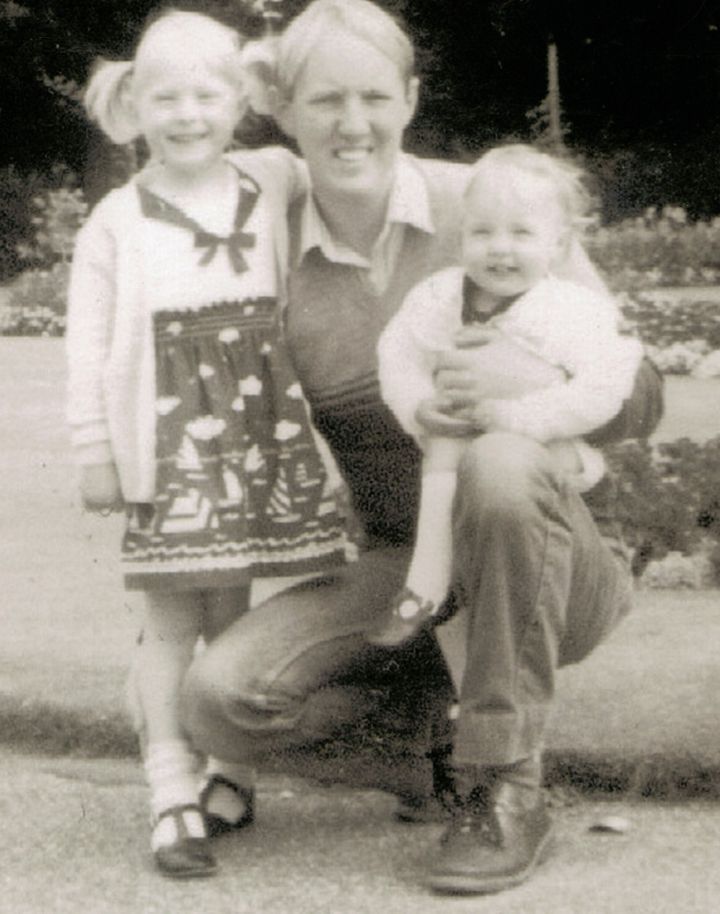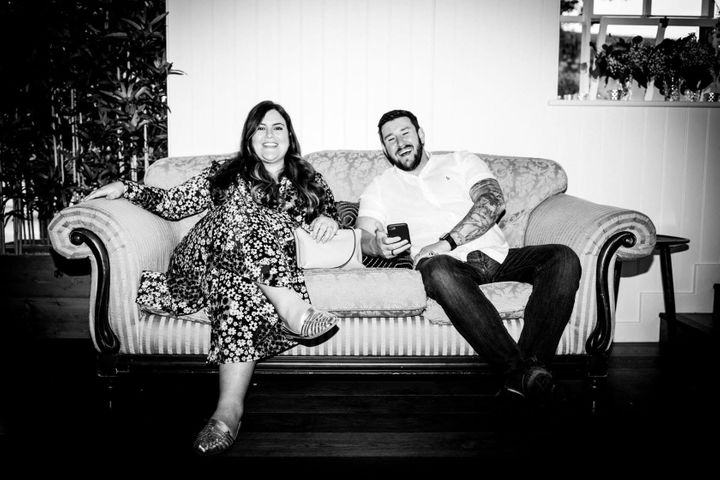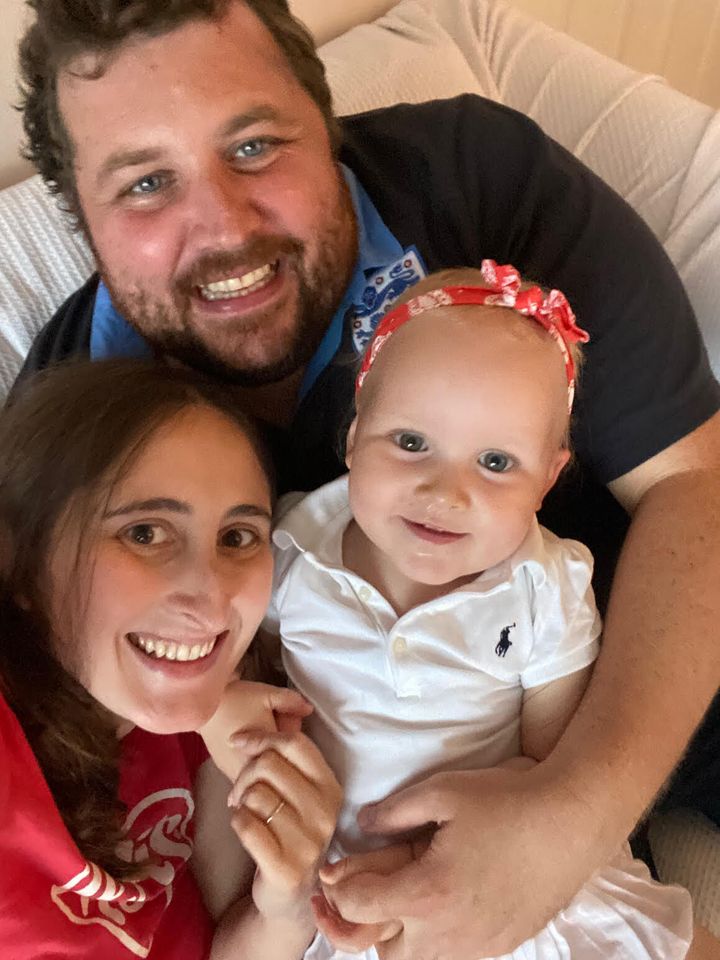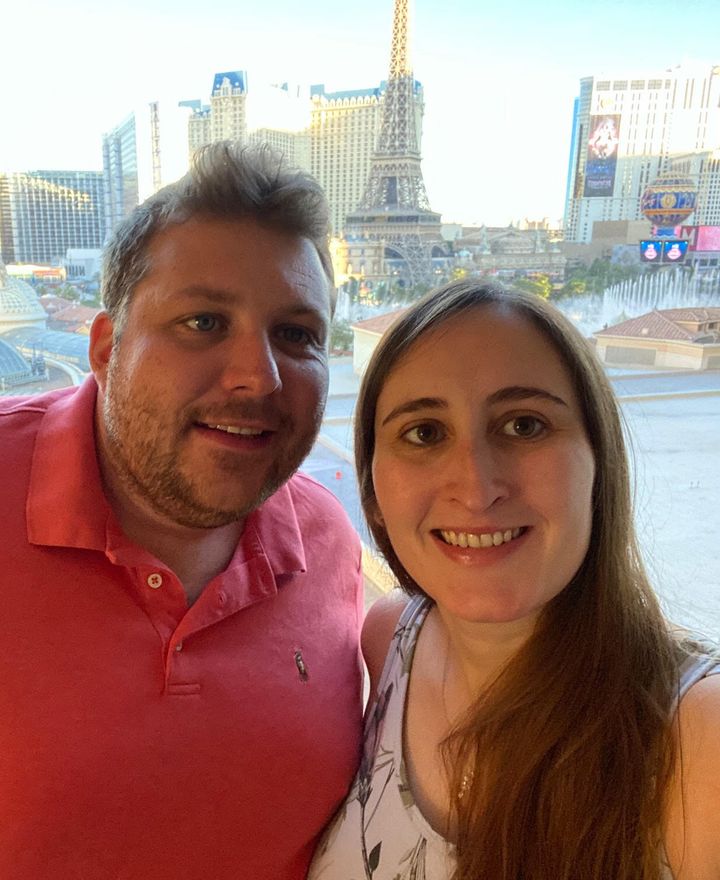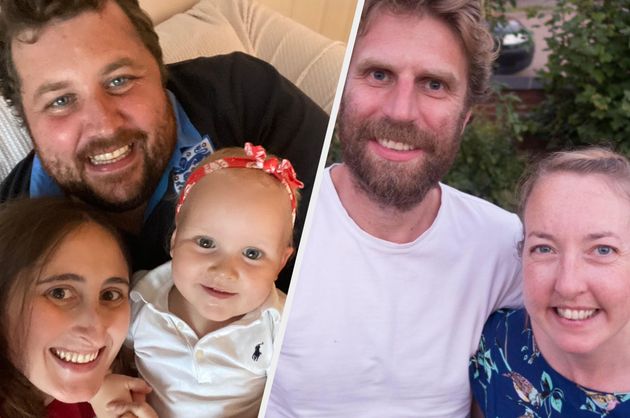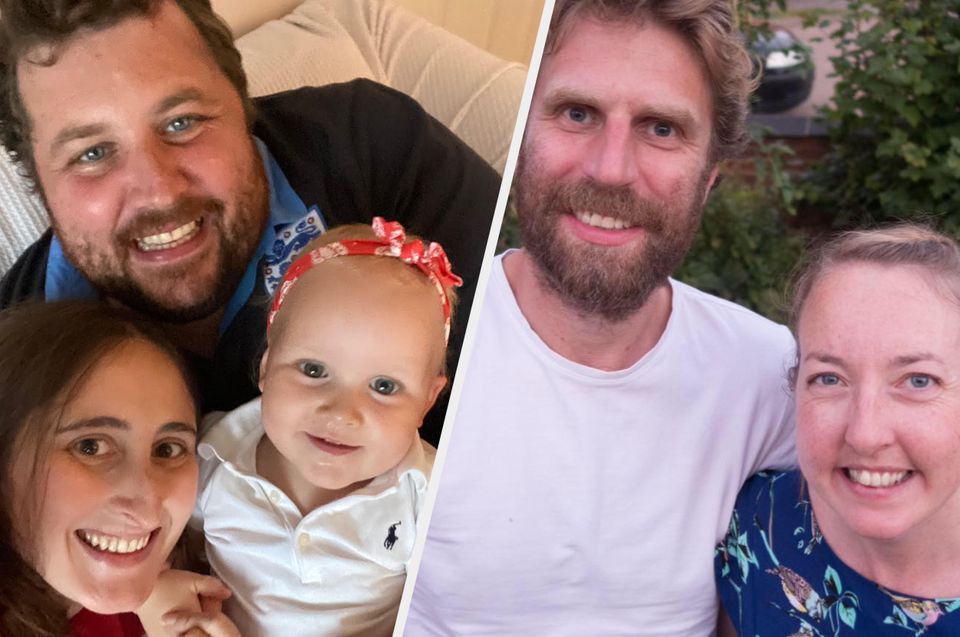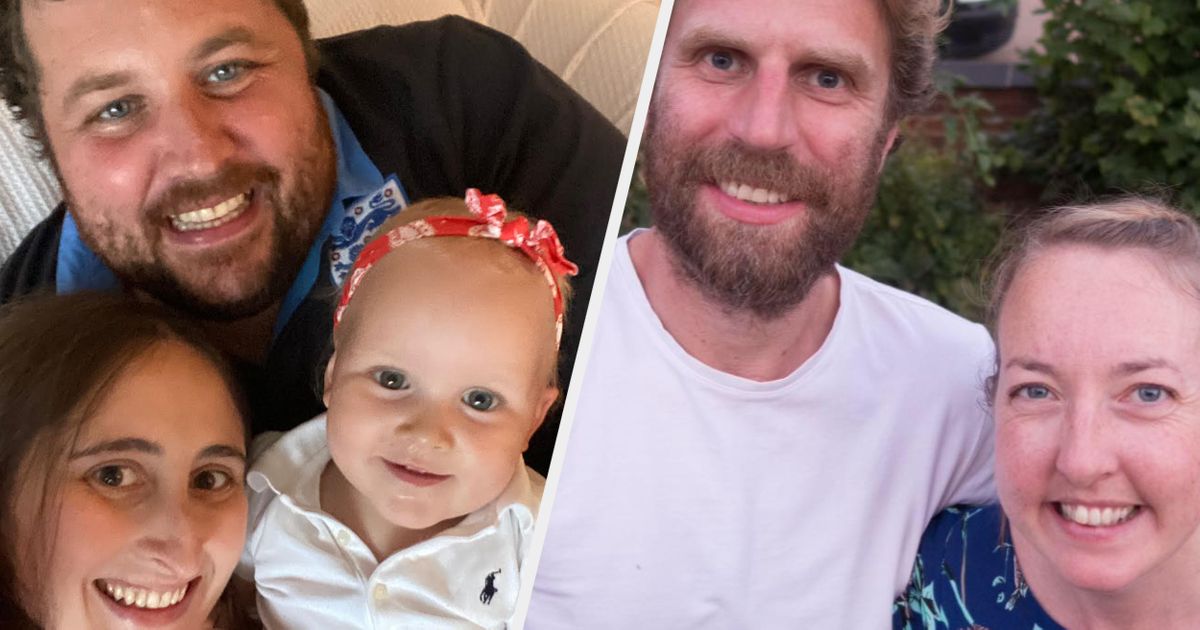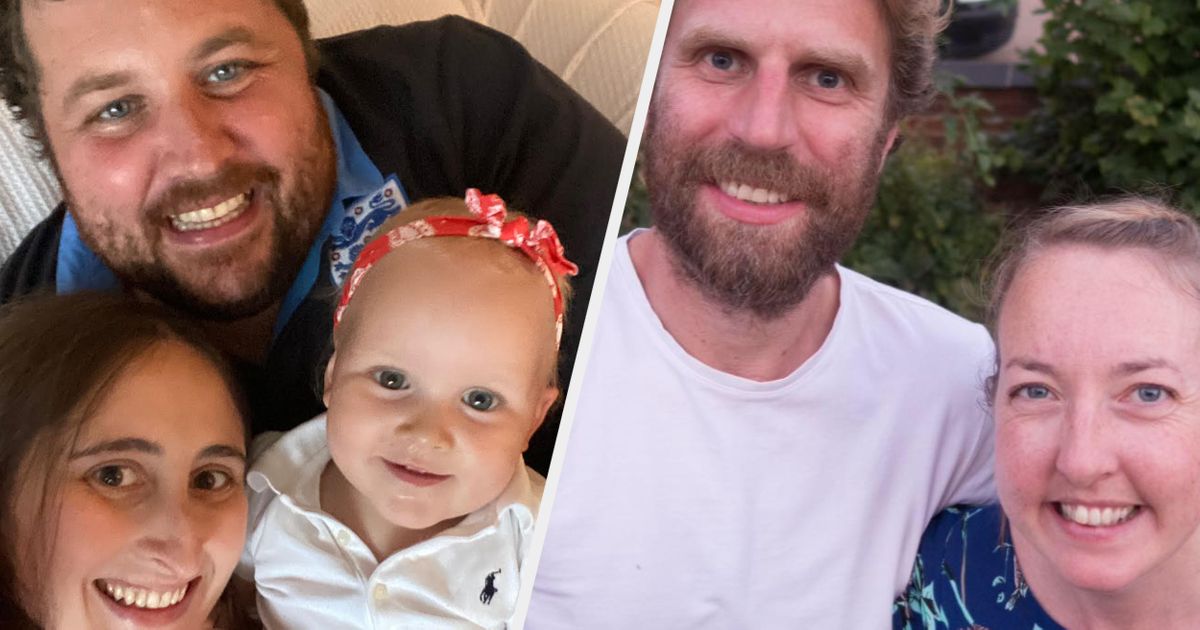I love asking people this question: What is it really like being you?
We can see how people speak and behave on the outside, but what do we know of their interior perspective?
What I love about this question is that it invites real intimacy and empathy. It’s an invitation into trust. I feel honored when someone does their best to answer honestly. It’s fascinating to discover how someone frames and experiences their interior world, at least to the extent they can articulate it.
I thought it would be interesting to answer this question too, if only to see what comes through when I try to answer it.
Centeredness
I love being me and really enjoy my life, which feels rich and rewarding. I feel like I figured out the big rocks and put them in place many years ago. I feel very aligned with the work I get to do and the people I regularly connect with, especially in Conscious Growth Club and the Transformational Leadership Council.
I don’t experience any meaningful doubt about the path I’m on, at least not at the macro level. I like to think carefully about the projects I commit to, but I can’t say that I ever seriously feel like making a significant change in my career path or lifestyle at this point. I’m always interested in upgrades and improvements, but the overall trajectory of my life feels like it’s already perfect for me.
So on the inside, I normally feel very centered and engaged with whatever I’m doing and experiencing. I enjoy a beautiful sense of harmony with my work and life balance. I don’t feel like work and life are separate. It feels more like the work and non-work parts of life are always dancing with each other.
Energy & Enthusiasm
One of the main emotions I experience is enthusiasm.
I love to feel positively stimulated with emotion, not all the time to the maximum, but as nice accents throughout each day. I like to feel amped up and engaged with life.
Partly this is a decision to move away from boredom and dullness. When I feel that the energy of a situation is a bit low for my tastes, I’ll often do something to shift it. For instance, I frequently like to play music and dance around while making meals. I love it when Rachelle does that with me too.
Every day I find something to feel enthusiastic about, usually many times each day. It could be a new business idea, but I’ll also generate enthusiasm for everyday experiences like greeting Rachelle when she gets up, doing a Zoom call, or watching a show together. I’ll even generate excitement about running errands.
My mind has a strong tendency to want to bounce away from boredom and towards feelings of engagement, playfulness, and fun. For me this aspect of my inner reality is solidly implanted.
Raising Vibes
I think this is something I learned from watching movies when I was younger. There are so many movie scenes where a high-energy character walks in, and the whole vibe of the scene changes. Or maybe it’s an unusual character who shifts the vibe of whatever scene they’re in. One example is Bill Murray’s character in Ghostbusters. Another is Val Kilmer’s character in Real Genius. Such characters were basically my heroes when I was younger. You’ve probably seen countless examples of these characters too.
When I interact with people socially, I often think about how I can stimulate them vibrationally… like what I could say or do to help connect them with more enthusiasm for their lives, experiences, and opportunities. Sometimes I feel that my role has been to shake people awake if they’ve been sleeping through life in zombie mode.
I sense that a great key to life is how we manage our energy, which includes thought energy, physical energy, and emotional energy. I think you can include spiritual energy too. I pay serious attention to the flow of energy through myself and through interactions with others. If the energy flow feels off somehow, I do my best to shift it in a more positive and constructive direction.
I think that for much of my life, I’ve felt a strong attraction to certain vibes and a strong repulsion towards others. As I’ve gotten older, I’ve gotten better and better at centering my life around the vibes I like and defending myself from vibes I dislike. I’m attracted to vibes like abundance, playfulness, curiosity, and creativity. I’m repulsed by neediness, close-mindedness, defeatism, and depression.
Thinking Algorithmically
Probably because I learned computer programming when I was a kid, I tend to think of life in terms of interesting problems to be solved and challenges to work through. I live in a world of puzzles to be figured out, and I love chipping away at these. These puzzles could include business challenges, creative challenges, personal challenges, and more.
I don’t worry if problems are solvable. I tend to regard everything as solvable and figureoutable. I generally assume that every problem has multiple solutions, so my mind starts churning on various solution pathways instead of fussing over whether it’s solvable. I’m much more concerned by which pathways seem the most elegant to me. I love to discover shortcuts.
Some problems in my life took me a long time to solve, but I eventually figured them out. It doesn’t bother me if some problems take years or even decades to solve. The time is going to pass anyway, and since I love working on interesting problems and challenges, I enjoy the experience of continuing to chip away at them.
I’m always looking to improve my toolset of problem-solving skills. Tackling interesting problems and challenges helps me improve those tools and upgrade my models of reality.
Belongingness
Imagine receiving thank you messages and expressions of appreciation from people around the world every day of your life. That’s been my reality for the past 18+ years, ever since I started blogging in 2004. That’s probably going to continue for the rest of my life, even if I stopped working.
Recently my book Personal Development for Smart People came out in China, so I’ve been getting a surge in appreciative emails from Chinese readers.
What does this do to my interior perspective? It gives me an unshakeable feeling of belongingness.
When I was younger, I often felt isolated and disconnected, like I was an alien in this world who didn’t belong here. I haven’t felt that way in decades though. Today I feel solidly at home here. I have zero doubt that this is where I belong – on this planet and in this field. I feel like I’m exactly where I’m supposed to be.
I feel at home whenever I travel too. Foreign locations don’t feel foreign to me. I’m so used to communicating with people from all over the world that it feels like the whole world is home.
Appreciation
I feel like I’m immersed in a reality that’s filled with experiences, people, and items to appreciate. I can’t seem to help feeling lots of appreciation each day. I appreciate my work. I appreciate my home. I appreciate Rachelle. I appreciate living in Las Vegas. I appreciate this community.
I also appreciate the little things in life. I spent time interacting with various objects and tech each day, and I learned how important it is to fill my life with items that evoke appreciation. This week I’ve been working with a bunch of hand tools to hang acoustic panels, and using them makes me smile sometimes because I carefully selected and purchased tools that I’d appreciate – such as a drill, tape measure, level, etc.
For me practicing appreciation was a huge key in shifting from scarcity to abundance, so this attitude of appreciation is indelibly woven into my mindset. Almost always when I touch something physically, there’s a part of me saying “thank you” internally for the experience. This happens when I put my hands on the steering wheel in my car, when I open up my laptop, when I pick up a knife in the kitchen, etc. I sense that we only have so many experiences in life, and I want even the most mundane ones to be infused with appreciation.
It would also be unusual for me to go through a day without saying thank you to someone for something. I love to express appreciation, and I sense that people could always use more of it. I would love to see more people expressing genuine gratitude for all the wonders we get to experience in this life instead of taking so much for granted.
When I die I want my last words to be: Thank you for this life.
Love
A big part of my interior perspective is that I enjoy being in love every day. I know a lot of people probably see me as a more mental creature due to seeing that side of me from my writing, but internally I feel a lot of love energy flowing through me each day.
I really, really, really enjoy and appreciate my relationship with Rachelle. Every day I get to spend with her is sheer delight.
Our relationship doesn’t feel effortful. It feels like a wonderful gift. I think that’s because we’re so ridiculously compatible. I recognize that what we have is very special, and on the inside that makes me feel very lucky.
I feel doubly fortunate that I get to see sides of Rachelle that she doesn’t often share with others. To people who don’t know her well, she may seem shy or introverted, but with me she shares so much playfulness, fun, love, warmth, and affection.
I’ve never had an issue with loneliness. I love solitary time too and don’t feel any significant resistance towards being alone. But I’ve spent most of my adult life in long-term relationships. I think one reason I’ve attracted partners pretty easily is that I just don’t feel needy in this area. I love being in a relationship, but I also love the experience of being on my own. I feel equally comfortable in both worlds.
I think this has been a key to new growth experiences. Don’t try to invite new experiences by resisting where you are. Try to love and appreciate your present reality as well as what you’d like to invite next. Send appreciation in all directions.
That was also a big part of shifting from scarcity to abundance. I wasted so much energy on the frustration of resisting scarcity when I was in my 20s. When I finally let go and surrendered to it – and actually welcomed it into my life as if I’d always be in scarcity till I died – that’s when the floodgates of abundance opened up. Learning to appreciate scarcity was a powerful lesson.
Freedom & Creativity
I also really enjoy my freedom. I haven’t had a job or a boss in 30+ years, so I’ve been on an independent entrepreneurial path since the early 1990s. It was rough during the first several years, but I eventually figured it out.
I don’t normally think of myself as an entrepreneur or business owner though. Those frames feel a bit too dull and mental to me. On the inside I don’t really fuss about my identity.
I love to create all sorts of things, so most days I’m thinking about what I’m creating. I could label myself as a creator, but that feels a bit off too. I’m not particularly concerned with how I’m labeled by myself or others. I’m much more in tune with whatever I’m engaging with in the moment. In terms of my identity, it feels more like water or wind – very flexible and adapting to wherever it goes.
The term “content creator” turns my stomach a bit, like it’s trying to smoosh something beautifully expansive into a small-minded box. It’s like putting a bird in a cage.
For me creativity and freedom are the Wonder Twins of my life. I see both as being essential for my long-term happiness and fulfillment. These are gifts from reality, but they must be claimed and defended.
Some people would say that they need freedom in order to create. I don’t think like that. It’s too limiting, and it points back to neediness, which is something I always want to bounce away from.
I regard freedom as something I can and must create. Freedom is a choice. But freedom without creativity is unsustainable, boring, and meaningless. I feel that I’ve invested a lot in creating freedom and freeing myself to create. On the inside it feels wonderful to be in a place where I can create, share, and express so much. This includes maintaining the freedom to keep creating without interference.
I don’t just think of creativity as doing creative work like writing articles, making courses, or doing workshops. I think of creativity as being the core essence of conscious living. That includes creating freedom, creating a life I love, and co-creating experiences with the right people.
Curiosity
On the inside I’m incredibly curious. I love to learn, grow, explore, and discover. I’m always finding something interesting to delve into. I love the process of discovering what the interior perspective of an experience is like. I’m very open to new experiences, especially experiences that can upgrade my thinking and understanding of life and reality.
Even when I’m not actively writing about it, I’m often doing some kind of personal growth experiment. Or I’m studying and exploring something new. Frequently I’m exploring multiple overlapping curiosities.
I’m currently doing a new dietary experiment involving testing a different macro balance (carbs, fat, protein). My goal is to aim for a caloric distribution of 70% carbs (or more), 20% fat (or less), and 10% protein (or less). This is similar to the 80/10/10 diet I did in January 2008 but with higher fat. It’s going very well so far.
I also recently researched acoustic panels, and this week I’ve been installing them in my home office. I also have some panels to install in my studio and a few in the living room. This will help to improve the audio quality on some recordings, and it will make my studio look nicer since I can finally remove the old sound blankets. I like the look of the panels too. Rachelle helped me pick the colors, and we spent a lot of time working on this together.
Last month I invested in some plumbing upgrades, hiring a plumber to install a new tankless water heater, water softener, and whole house water filtration system. I also did a plant medicine journey with some friends.
Last year around this time, I was exploring home theater systems and invested in a major upgrade there. That was one of my favorite explorations because it totally transformed the experience of watching movies and shows with Rachelle, especially action movies. That gave me even more to appreciate.
One of my biggest challenges is that I can get too curious and open too many new doors simultaneously. I love saying yes to new experiences and explorations, but I also have to practice saying no a lot to avoid overextending myself.
Order
On the inside, my mind feels very sharp and orderly. I’m usually very adept at focusing and directing my mind to advance the projects that I want to work on.
I have many dozens of projects mapped out with action steps (I currently use the Things app for this). Realistically it may take me years to complete all the projects I’ve already identified. Week by week I keep chipping away at them.
I also maintain a quarterly completion log, whereby I document what I’ve gotten done or experienced each calendar quarter. I’ve been doing this for about 5 years consistently, and it’s really helpful for progress visibility. I can see where I moved projects across the finish line. Sometimes I may feel like I didn’t get as much done as I would have liked, but when I review those quarterly logs, I’m usually impressed with how much I actually finished.
My life is typically a mix of pre-planned work plus spontaneous action. I’ve gotten pretty good at taking action both inspirationally and methodically. I love having the flexibility to choose which tasks and projects I’ll work on each day without prescheduling them. Most days my calendar is blank. But I also keep track of many competing priorities to weave in when the timing is right.
I like keeping my physical environment neat and tidy. When clutter piles up, it’s very temporary. I feel a strong desire to keep moving towards greater order. When items and tasks are in order, it frees my mind to think more clearly, to be more creative, and to take more action. I think one reason that I embrace order is that disorder is very distracting for me.
Optimism
I don’t get depressed. Simply never. My mind stays focused on the positive – on inspiring ideas, engaging people, action steps, interesting projects, creative explorations, etc.
I used to get depressed sometimes when I was younger, but I put a stop to that.
I decided a long time ago that depression is a stupid waste of life and that it was critical to defend against the slime pit of depression, self-doubt, and other downer modes of experience. Otherwise it becomes a trap where one can lose years of precious life. I regard depression as a nasty neural pattern – a mental and emotional virus – so I did what was necessary to ensure that my mind just doesn’t go there anymore. I felt that was one of the early personal development battles where I had to win a decisive victory. So this is a virus to which I’ve built a very strong immunity.
There were lots of pieces to this – cleaning up my diet (zero animal products); regular exercise that I enjoy; dropping misaligned people; committing to meaningful and fulfilling creative work; saying no to partial matches; and creating a life rich in intimacy, warmth, and affection.
I really appreciate my past self for putting so much effort into upgrading his mindset and heartset. That was a real challenge for him, but he did a fabulous job of solving those problems one by one. He gifted me with sustainably constructive thoughts and feelings. That’s a huge gift since I no longer feel like I have to fight with myself internally. My mind and emotions feel very harmonious.
Thoughtfulness
I like to be very thoughtful and deliberate in making decisions, especially important ones. I use many tools and processes to work through decisions methodically. For instance, when designing a new course, I follow a step-by-step design template that I’ve developed over the years. It’s one of the bonuses in the Amplify course.
To really know that I can complete a project, especially a big one, I have to reach a point of strong commitment. When I was younger, I left too many creative projects unfinished because I started them impulsively, and I hadn’t put the right level of thought into them up front. Then I’d struggle partway through with thoughts like, What’s the point of finishing this? Or something else would distract me, and I’d lose focus on the previous project.
Today I’m way better at finishing projects. I look at them carefully and analyze them from different angles, often spending weeks or months in the pre-commitment phase. Some projects don’t converge on commitment, but when I’m able to commit, I’m really good at following through all the way to the end.
What this does for my inner experience is that I have super strong creative trust. I know what it takes to complete a sizable creative project. I know how to get myself to the point of commitment, and I’m able to trust myself to follow through and finish. I also know how to recognize when the alignment isn’t there yet, and I shouldn’t commit myself.
It took time to discover the right process for me such that I could make wise decisions intelligently while also avoiding analysis paralysis. Having a process that converges really helps.
Relationships
Internally I think about almost all aspects of life through the lens of relationships. This includes people, tasks, projects, goals, possessions, food, activities, locations, and more.
Instead of thinking so objectively about different aspects of life, I usually favor subjective thinking. I imagine how different decisions will affect my inner experience. I think more about the dynamic flow of events than about the static nature of situations.
You could say that I think in terms of verbs more than nouns. Where is the energy flowing? How is it changing? How do I want to engage with these energy patterns?
When I’m considering a new creative project, I pay a lot of attention to how I’m going to relate to that project while I’m working on it. I don’t just think about the end goal or result. At least 80% of my thinking is focused on what the journey will be like (probably more like 90%+). I want to make that journey beautiful and engaging.
I’ve invested a lot of thought and energy into creating a beautiful and harmonious relationship with my work and life. This includes how I relate to the people who engage with my work.
What I love about this relationship model of thinking about life is that it helped me get really honest with myself. It encourages me to be more forthright about expressing how I really think and feel. Can I share that I’d love to see Vladimir Putin slowly fed feet-first into a wood chipper, while being given frequent espresso breaks along the way? That’s actually one of my intentions.
Defending Against Misalignments
Some of my energy flows into defensive activities, which is a part of my life that many people don’t see. I have standards for the people I want to engage with, and I’m not interested in lowering them to build a larger but misaligned audience.
That’s one reason I tell Trump supporters to begone. I have no interest in serving racist idiots and assholes. That isn’t political. It’s personal. I find such people utterly loathsome, and I want nothing to do with them. I don’t want to invest my energy in dealing with people who disgust me, so I choose not to deal with them. Moreover, I will continue to staunchly defend this community against them, especially Conscious Growth Club. Such idiocy has no place here.
I have to deal with occasional stalker-types as well, including people who clearly aren’t right in the head. That doesn’t get me down. I just see as it part of the experience of working in this field.
If I wanted to be a mental health professional who regularly engages with such people, I’d have chosen that as my career path. I realized a long time ago that I must carefully defend the path that resonates with me, and that requires being very firm in saying no to people and situations that I’m not willing to deal with. We don’t automatically get what we desire. We get what we’re willing to tolerate.
When people fall out of resonance with me, I prefer to just let them go. If someone violates my trust, I drop them from my life, and I really never let them back in because when I did so in the past, they always gave me cause to regret it. “Fool me once” is enough for me. There are so many interesting people to interact with in this life that it seems foolhardy to bother dealing with misaligned scraps. I now realize just how needy and desperate that is. That said, I very easily forgive people and have no interest in holding grudges, but when I close the door on someone, it’s really closed. From my own perspective, I see this as returning their energy back to the Simulator, where it can be recycled. This keeps my energy from getting stuck where it doesn’t want to be stuck.
I’m committed to flowing my energy where it wants to go and engaging with people who want to explore and engage with me in a mutually supportive way. That takes a certain degree of alignment and compatibility. It’s exquisitely joyful and rewarding to serve people who meet that standard. And it’s disappointing at the very least to attempt this with people who don’t.
Some people and experiences are like the perfect puzzle pieces that interlock with us in just the right ways. Even when our interactions are temporary, that kind of alignment is beautiful to behold. In order to invite more of this, I found it crucial to say a hard and definitive no to the misaligned. Otherwise partial matches and mismatches will block so much beauty, wonder, and delight from flowing through.
High-Trust Relationships & Audience Engagement
Years ago I went through the experience of building up lots of followers on social media and being very active on those services daily. It can feel fun and stimulating having so much attention, especially if you enjoy being in the limelight. I also found those interactions too random and chaotic, and I was glad to delete Twitter, Facebook, and Instagram and tighten up my social focus. Seeing what’s been happening on Twitter these days makes me even more grateful to have dumped it in 2014.
After that I went through a process of focusing more on audience alignment than on audience size. That shrunk my overall audience but also made me feel happier and more in tune with my work. It helped me go much deeper into explorations that inspire me and others – less blogging but more courses, workshops, and of course CGC itself. It’s like we become more courageous, more heart-centered, and more genuine when we’re surrounded by the right people.
I’ve gotten used to having an audience for my work since that’s been my daily reality for decades, all the way back to my computer games business. The people I serve are in my mind each day, and I interact with them every day in some way – through email, the CGC forums, Zoom calls, blogging, videos, in person, etc.
To me this doesn’t feel like a temporary situation. It feels permanent, at least as far as my lifespan is concerned. There are people in my audience in their 30s now who started reading my blog when they were teenagers. I know this because many of them have told me so. I expect that even decades from now, many of the same people who are engaging with my work today will still be engaging with it or with the community around this work.
That really makes me think about how to keep serving the people in this community for the long term. I know that the specific people in this community will fluctuate, but there’s clearly a core base of people that feel a sense of commitment and resonance, so I think we’ll be in each other’s lives for a long time to come.
I love engaging with people on the basis of mutual appreciation. I like having an audience that appreciates me and the work and I do, and I love engaging with people that I appreciate too. This is something I never take for granted. It’s something I always want to keep investing in.
High-trust relationships are very important to me. Trust empowers us to explore so much more together. That’s another reason that certain people have no place in this community. We can’t build high-trust relationships with people who serve as enablers of lying and deceit.
Caring
I think one reason I’ve enduring so long in this field is that I genuinely care about the people in this community. That’s an aspect of my interior perspective that I think a lot of people don’t see. Of all the items I’m sharing here, I’d say that the #1 insight I’d love people to know is that I really do care. I want to see the people in this community thrive and enjoy rich and fulfilling lives. Just writing this part makes me teary-eyed.
I work hard at figuring out how to help people grow and how to keep serving them year after year. For me this is a lifelong investment, and I want to keep getting better at it. Sharing ideas is just one piece to the puzzle. Another piece is having a stable community where people can invest in each other (Conscious Growth Club). And yet another piece is continuing to listen for where the latest needs, desires, and growth opportunities are.
The road ahead is going to bring so many fresh challenges and opportunities. I want to help the people in this community intelligently navigate those experiences. I love the challenge of playing that role and figuring out where I can be of service.
A big part of my motivation comes from the people I serve. I don’t write just to write. I always write for people. I create courses for people. I develop workshops for people. I coach people. And it’s not for people in general but specifically for the people in this community – past, present, and future.
Internally I often feel that it’s other people’s energies and intentions that summon me to do the work I do. Somehow they energetically invite me to help them. So I never feel like I’m writing or creating into an empty void. I always feel like I’m co-creating with the energy that invited me to the dance.
I also see an important connection between caring and defense. In order to feel safe expressing caring and building high-trust relationships, I think it’s critical to defend against the opposite. I don’t trust blindly. I test for trust, and when I see it, I keep investing. But when people abuse my trust, they get the sword and shield.
Support & Cooperation
Internally I feel very creatively supported, and I have a very cooperative relationship with life. Life has given me everything I need to do my best creative work. I wanted to be of service to people, and life said a big yes to that in response.
When I was younger, I tried to do a lot of work under pressure, especially financial pressure and time pressure. There was this sense of always trying to scramble to get enough done to make ends meet. That wasn’t a situation where I could do my best creative work.
Back then my mindset and heartset were more competitive than cooperative. I put too much attention on my individual success and accomplishments, even though that just created more stress and pressure for me. I tried to motivate myself with misaligned forms of motivation. I focused too much on end results, and I leaned too heavily on courage and discipline to try to push through difficulties. I wish I had known back then how much more effective it is to focus on the journey and on cultivating a beautiful relationship with it.
Today my life feels very much the opposite of stressful. It’s fun and engaging, but it’s also peaceful and relaxing when I want it to be. Life feels very spacious, welcoming, and encouraging.
I love that I get to spend so much time exploring the richness of life, relationships, creativity, and fresh possibilities. I feel very in tune with the journey I’m on, and I delight in how it’s unfolding each day.
This isn’t an exhaustive list, but hopefully you found some value in one or more of these insights that may be useful to you in your own life or work.
Happy New Year! 🥳 🎉


